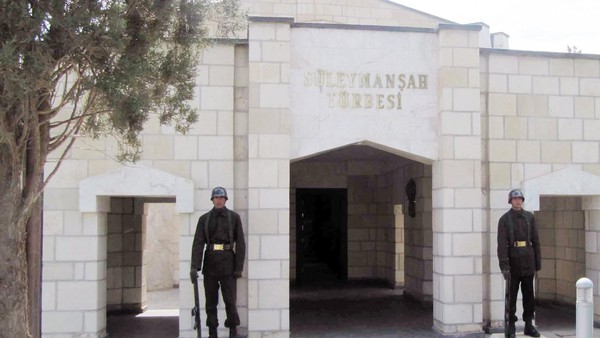Turkish troops enter Syria to evacuate historic Suleyman Shah tomb

Turkey has carried out its biggest intervention to date in Syria, dispatching 572 troops and 100 vehicles to evacuate an enclave increasingly vulnerable to jihadis of the Islamic State of Iraq and the Levant, known as Isis.
The evacuation of the tomb of Suleyman Shah, a 13th century ruler whose remains were guarded by 38 Turkish personnel, was carried out through Kurdish-held territory in Syria, taking advantage of recent advances of Kurdish fighters.
The operation also appeared to reflect growing concern in Ankara over Isis after a January suicide bomb attack in the heart of Istanbul’s tourist district and warnings that foreign diplomatic missions in the country were being targeted.
A series of reports in recent months, sometimes denied by Turkish officials, suggested that the soldiers in Suleyman Shah were effectively under siege by the jihadi extremists.
Ahmet Davutoğlu, Turkey’s prime minister, announced the Suleyman Shah operation on Sunday morning, saying that one soldier had died in an accident but that there had been no fighting as a result of the incursion.
“It was necessary to take measures because of the increased clashes and increasing tension in Syria,” he said, adding that the incursion had been approved by president Recep Tayyip Erdoğan, Turkey’s paramount leader.
Mr Davutoğlu said the operation, which began at 9pm local time on Saturday and ended just after 6am on Sunday, involved two columns of Turkish forces, 49 tanks and 51 armoured vehicles.
One column headed for the village of Karakozak, where the remains of Suleyman Shah were located, and evacuated the soldiers and the relics before destroying the site. The other column raised the Turkish flag in Esmesi, a Syrian village just metres from the Turkish border, where Ankara intends to reinter Suleyman Shah’s remains.
A Turkish official confirmed that Ankara had also informed Damascus of the operation beforehand, through a diplomatic note delivered to the Syrian consulate in Istanbul.
Mr Davutoğlu said Turkey had given “necessary information” about the operation to “local units” and to the US-led coalition against Isis ahead to prevent civilian losses.
Syrian activists confirmed the co-operation with Syrian anti-government rebels, including Kurdish forces in the area, who are generally at odds with Turkey because most are aligned with the Kurdistan Workers’ party (PKK), with which Ankara fought a three-decade war. /End/
